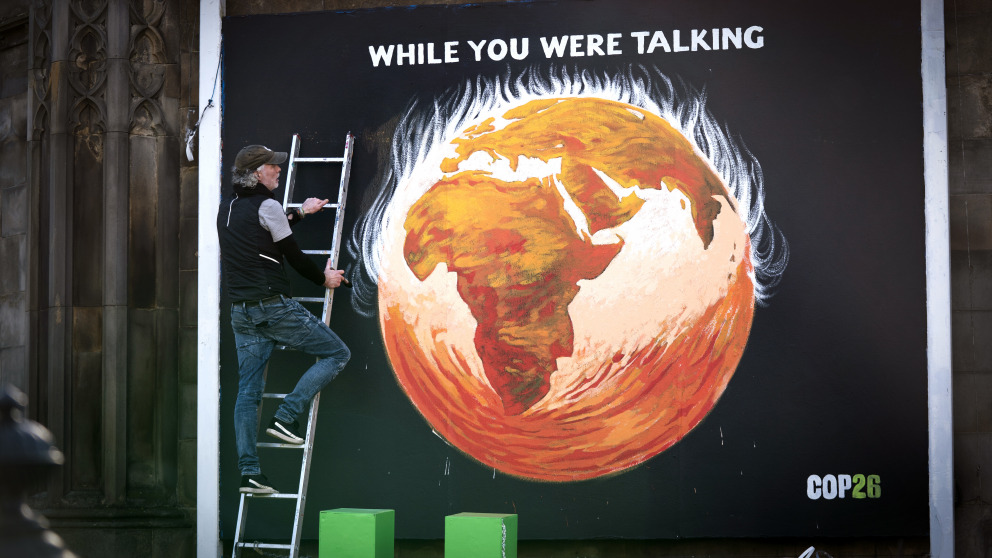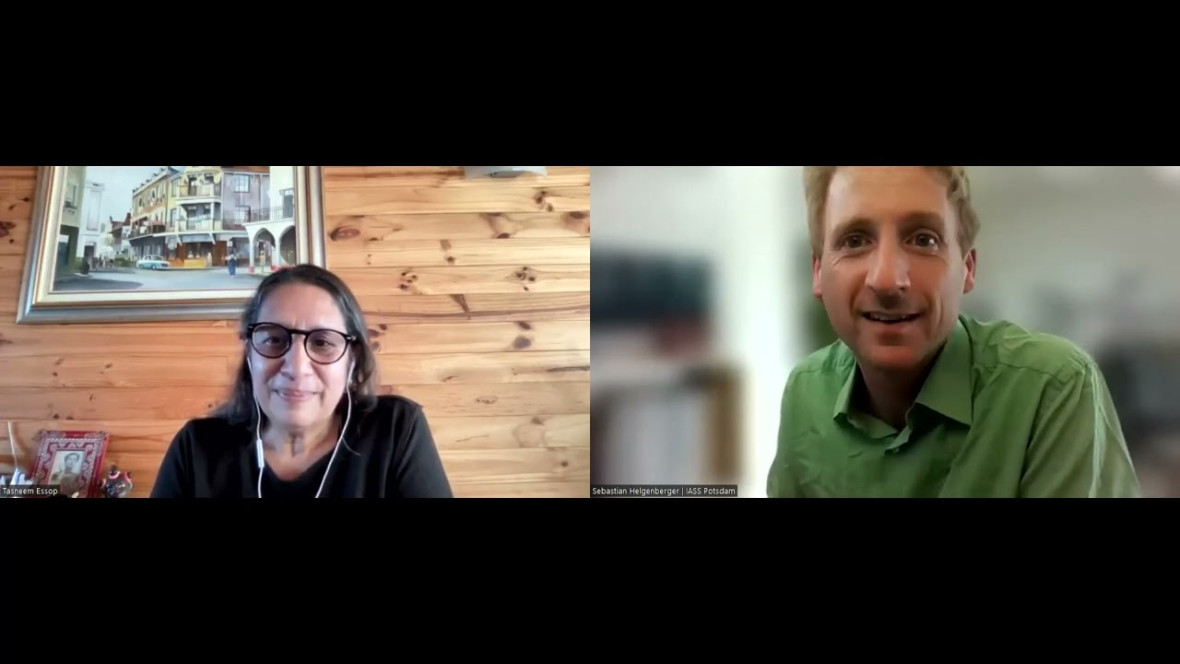How can ambitious and just climate action be ensured through the participation of civil society?
26.07.2022

Tasneem Essop, Executive Director of the Climate Action Network (CAN), held an inspiring lecture on the vital but often downplayed role that civil society can play in ensuring ambitious and just climate action. CAN is a global network of over 1,800 civil society organisations from over 120 countries that are fighting the climate crisis. The lecture took place as part of the monthly IASS Focal Topic Year on “Justice in Sustainability” public lecture series on May 19th, 2022.
Essop argued that civil society actors do not have a significant seat at the table in multilateral climate negotiations such as those at the UN level or at the COP. “We get the opportunity to say something in about two minutes in some interventions in a plenary that takes place in the early hours of the morning when the governments have left. And, in some cases, we are even shut out of the processes completely.” In her talk, Essop stressed that addressing the climate crisis through science is not sufficient since those who are the least responsible for the situation bear the brunt. Climate change and inequality can and must be addressed together. Including civil society actors is one way to deal with fundamental injustices.
Climate justice: distributive justice & procedural justice
Essop noted that climate justice consists of a model that helps to redress injustice and is comprised of three aspects: 1) distributive justice, 2) procedural justice and 3) intergenerational justice. Although fundamental, procedural justice – i.e., having all actors at the table when decisions are being made – is often not taken seriously. Usually, procedural justice is only performative. Substantive participation of all those affected does not take place, since power asymmetries are not considered – this despite the fact that procedural justice is a precondition of distributive justice.
Distributive justice is crucial for the energy transition. As Essop pointed out, producing ever-larger quantities of electric vehicles is not going to help those most affected by the climate crisis. Although many governments and businesses regard electric vehicles as the solution to the climate crisis, informal settlements do not even have roads, so they would not be able to use an electric car even if they could afford one. In other words, to find an energy solution that does not benefit the Global North to the detriment of the rest of the world, vulnerable groups must be included in the decision-making process. In sum, distributive justice – and just decisions – cannot come about without procedural justice. Essop reiterated that easy fixes to climate justice do not exist, but, at the same time, that we do not have a lot of time to find solutions.
Contributions of civil society actors
But how exactly can civil society organisations contribute? Firstly, they can push governments to increase their levels of ambition. Secondly, they can underscore the importance of ensuring justice, especially to those who are experiencing the injustice most sharply. This also applies to multilateral processes. For example, the issue of loss and damage came up as a key justice issue at the 26th UN Climate Change Conference of the Parties (COP26) in Glasgow last year. Given the fact that loss and damages are already occurring, support for the most vulnerable is now more pressing than ever. Notably, the topic of loss and damages finance initially was not on the COP 26 agenda. It was only due to pressure from CAN and other civil society actors that it was included in the official discussions. According to Essop, this demonstrated that civil society could exert power. However, she added that meaningful, civil society-inclusive multilateral processes do not take place because many of the systems they require are not set up yet. These processes are party-driven and government-dominated, with civil society participation happening only on the side and focussing on advocacy work.
Dealing with power dynamics
Aspects of colonialism through to capitalism and neoliberalism caused the crises in our multilateral system and put uneven power dynamics into place. In decision-making processes, actors must be aware that these are the basis of the current predicaments that we face. Ensuring that transitions are fair is a deeply political challenge, so problems of power and the crisis of democracy must be dealt with. As Essop stated: “How do we decolonise our decision-making processes? Constantly forefront the power dynamic. Call it out.” Then, procedural as well as distributive justice become far more important. To illustrate the point, Essop gave the example of the just energy transition in South Africa, where power dynamics play an important role. Deliberative discussions outside of these power dynamics were held with vulnerable communities before the official negotiation forums. This shifted the power dynamics significantly and as a result, the coal phase-out was made possible.
At the global level, the principle of historic responsibilities is key for redressing injustices. Essop notes that justice asymmetries are not only a problem between the Global North and Global South: the socioeconomic status of the most vulnerable groups is also an important factor within countries.
Essop further criticises that Western knowledge systems predominate. Top-down Western expertise hinders deliberative participation and bottom-up change. Yet, to tackle the climate crisis in an equitable way, the intersectionality of science is important, so indigenous and local knowledge systems must be recognised. Finally, Essop pointed out that civil society actors must reflect on these issues as well because they themselves mirror these injustices. Injustices in terms of power and resources, and who dominates and makes decisions or sets the agenda, also exist in the civil society sphere and must be taken into account.
In a perfect world…
Not only the quantity but also the quality of civil society participation is important. Ultimately, multilateral processes must shift away from being party-driven to being social partner-driven processes so that all key partners have a seat at the decision-making table. The climate crisis is a collective problem – so we need a collective process to tackle it.
To conclude, Essop emphasised that civil society actors need to be provocative in their climate action so that injustices can be adequately addressed. Essop closed her lecture with a stark warning: “The time for diplomacy is passing, we must speak frankly now.”
Media
Tasneem Essop: Civil society in climate forums
